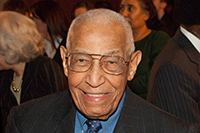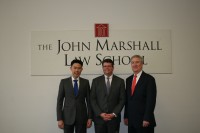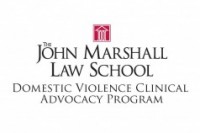
It is with great sadness that we announce our dear friend and beloved adjunct professor, Hon. George N. Leighton (October 22, 1912-June 6, 2018), has passed away. Leighton, who was 105, is survived by two adult daughters, five grandchildren and eight great grandchildren.
Leighton was a distinguished lawyer, federal judge, civil rights champion, and longtime member of the John Marshall adjunct faculty. He was the first African-American to sit on the Illinois Appellate Court, and his name adorns the Cook County Criminal Courthouse.
He will be dearly missed.
Despite not having a high school diploma, Leighton, the child of immigrants from the African Cape Verde Islands, graduated with honors from Howard University and Harvard Law School. He moved to Chicago in 1946 and became a successful defense attorney, devoting his career to equal justice under the law.
Leighton was active in the Chicago branch of the NAACP, serving as the Chicago president and general counsel, and was a founding member of Moore, Ming & Leighton, one of the largest predominantly black law firms in the country at that time.
He was elected to the Circuit Court of Cook County in 1964 and was appointed to the Illinois Appellate Court in 1969. In 1974, Leighton was appointed by President Gerald Ford to the U.S. District Court for the Northern District of Illinois, where he presided over cases until his retirement. Leighton left the bench in 1987 and joined Neal & Leroy LLC, where he handled many prisoner rights cases. He retired at the age of 99.
“I was an intern for Judge Leighton while I was a law student. I loved listening to the stories he shared about his work as a civil rights lawyer before he became a judge. We played chess in his chambers. It was one of his hobbies. He won every game. He was one of the smartest, kindest, and most interesting men I’ve ever met,” remembers Professor Mark Wojcik.
Leighton was an adjunct professor at John Marshall from 1964 to 2004 and taught Criminal Procedure and Prisoners’ Rights. He was a strong supporter of John Marshall’s evening program and worked tirelessly in the 1960s and 1970s to convince the American Bar Association to continue to accredit evening law school programs.
Services by the family are being planned.


